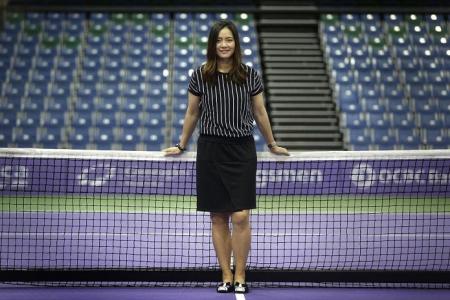Melissa Pine: Hard work, mental strength needed to mould champ
An icon, hard work and mental toughness all necessary to mould a Serena or Li Na
There has been much talk of youth development programmes of late.
With the increased attention various national sports associations in Singapore are paying to such an initiative, it is clear a successful youth development programme is vital.
If you look at US tennis in the late 1990s there was a huge contingent of really strong players, both in the men's and women's game.
It may not be that way in recent times, but it is not a huge problem with youth development in the US, it is just the typical cyclical nature of the process.
There is a lot that goes into the making of a great player: good coaching, hard work, and inspiration.
I believe it is hugely important for a country to have a local hero for the next generation to aspire to be like him or her.
You see it in many different countries - Madison Keys looked up to Serena and Venus Williams; German players coming up wanted to be like Stefanie Graf and newly-crowned French Open champion Garbine Muguruza counts Arantxa Sanchez Vicario as an inspiration.
It's important to have a pathway, and someone who has walked on that pathway before.
The WTA has not delved into youth development as that's handled by federations and governments or even by former players like Justine Henin, who has set up an academy in Belgium.
Li Na is setting up her academy in China and Chris Evert runs one in the US.
But the WTA Finals can help lay a framework for the future and the WTA Future Stars is an example of how we can get more kids playing the game.
Just having the WTA Finals in a country can provide extra inspiration for young players who get to see the superstars of the game up close.
Of course, it takes time to see tangible results.
The WTA Finals was held in Istanbul, Turkey, from 2011 to 2013, and only this year did Turkey see its first player - Cagla Buyukakcay - win a WTA title, when she lifted the TEB BNP Paribas Istanbul Cup in April.
This year was also the first time in the Open Era that a Turkish player made it to the singles main draw of a Grand Slam, when Buyukakcay and Ipek Soylu both qualified for Roland Garros.
This happened some five years after the WTA Finals first went to Turkey, and there is potential in Singapore, where the WTA Finals has been since 2014.
Singapore has great facilities and tremendous government support. With all that in place, there is no reason why a country like Singapore cannot have a top player in the WTA.
Singapore already has Stefanie Tan, a great college player who recently won two tournaments on the ITF.
The reality of it is that there is no substitute for hard work.
There is on-court training, strength and conditioning, mental training, and competition - these four elements are critical to the development of a professional player.
As a coach myself, you always say that tennis is 80 per cent mental, people forget about that side of things.
It's such a fine line separating a champion and the rest, and often what makes the difference is mental toughness.
Li Na used to work from eight to five every day, one hour warming up, two 75-minute fitness sessions, two 90-minute sessions on court, and she had to squeeze in lunch and some rest time. It is important to have great coaching, but in the end it comes down to the athlete, who has to really, really want it.
Someone like Li Na doesn't come around very often, but I think she has already inspired Chinese players. Right now there are already three players from China in the top 100 in singles, with Zhang Shuai making a great run to the quarter-finals as a qualifier at the Australian Open.
And for all we know there is already a young girl already working hard every day on a court somewhere in Asia, who will become the next Li Na.
- Canadian Melissa Pine is a former NCAA player and a columnist for The New Paper. She is the vice-president of WTA Asia-Pacific and also the tournament director of the WTA Finals. Held in Singapore from 2014 to 2018, the 10-day tennis extravaganza showcases the world's top-eight singles players and doubles teams competing for a grand prize of US$7 million ($9.6m). For more information on the event, visit www.wtafinals.com
Get The New Paper on your phone with the free TNP app. Download from the Apple App Store or Google Play Store now


